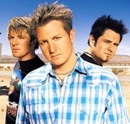 It’s reasonably safe to say that country music hasn’t been friendly to the gay community (are you listening Big & Rich?), perhaps based in the geographic, religious and conservative roots of the genre. While not homophobic in the same sense as some rap or reggae music as evidenced in those genre’s lyrics, there is an element of homophobia with regards to the people who make and buy country music. The genre does not welcome or encourage gay artists, nor gay fans.
It’s reasonably safe to say that country music hasn’t been friendly to the gay community (are you listening Big & Rich?), perhaps based in the geographic, religious and conservative roots of the genre. While not homophobic in the same sense as some rap or reggae music as evidenced in those genre’s lyrics, there is an element of homophobia with regards to the people who make and buy country music. The genre does not welcome or encourage gay artists, nor gay fans.
There are always notable exceptions. Dolly Parton. Emmylou Harris. Lee Ann Womack. The Dixie Chicks of course… And, yes, even Willie Nelson. But they are few and far between. Country music artists who are gay or gay-friendly must keep it to themselves, or risk taking a hit to their fan base and their bottom line.
Popular country music band Rascal Flatts may take such a hit thanks to an interview about their newest single “Love Who You Love” off their new CD Unstoppable.
“We actually have some gay people that work with us, and we have a lot of friends that are gay, too, and I know that this song has inspired them,” said singer Gary LeVox during an interview at CMT earlier this month. “I know that coming out was tough on their parents and on them and the whole entire family. For a long time, some of them didn’t get to hear ‘I love you’ from their dads or be accepted in that way. … It’s helped a lot of our friends.”
“That’s what’s cool about our music,” says guitarist Joe Don Rooney. “You can interpret (it like) that. If you get that — it’s perfect. If you are someone who’s gay or someone who’s straight, you still feel something from the song, and that’s what we want.”
“We don’t judge anybody’s lives,” says bassist Jay DeMarcus.
As a cynic, I always question the motives behind statements like these as simply trying to sell more records as opposed to genuine sentiment. I cringe every time I hear “we have a lot of gay friends.” But despite all that I will give them the benefit of the doubt, despite our political differences (art should always transcend politics). Rascal Flatts is taking a chance in this interview, and that has to count for something.
If country music is to turn the gay corner, it must do so gradually as not to alarm or antagonize its fans. We all remember what happened to the Dixie Chicks when they spoke out against President Bush. It nearly ended their career, and they are still taking flack for it. Perhaps a gentle nudging over time will lead to a little more tolerance, or better yet, acceptance.
Now, a bit about me and country music…
Growing up with parents from the south, I had little choice but to listen to the likes of George Jones, Tammy Wynette, Merle Haggard and Loretta Lynn.
But as I entered my teens, country music become totally uncool, totally. I complained regularly to my mother that most country music was about drinking, cheating, and D-I-V-O-R-C-E. and that I could no longer be bothered with it. I began to discover rock music, listening to the Eagles, Billy Joel, Fleetwood Mac, Foreigner, and later — this will be a surprise — ABBA, Duran Duran and Olivia Newton-John.
I had all but abandoned country music until my late 30s, but thanks to iTunes I began to revisit all those artists that I had so loathed growing up. Partly out of a sense of nostalgia, but mostly out of dearth of current music to which I could connect with. I began to listen to Dolly Parton, Emmylou Harris, Tanya Tucker and Anne Murray among others. I found I loved the music, perhaps because to varying degrees they were outsiders, or because the music for me exhibits a gay sensibility. It would be nice to have more artists like them to carry the torch.
The country music business should encourage gay artists and fans. There’s a lot of talent out there and a loyal fan base looking for someone to follow and love.

 Ted Behr of
Ted Behr of